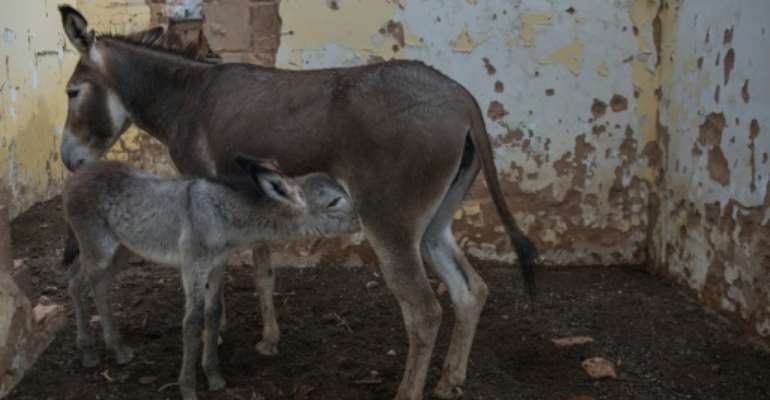Donkey milk gains popularity in Botswana as treatment for post-COVID complications

Donkey milk gains popularity in Botswana as treatment for post-COVID complications. PHOTO|AFP/FILE
What you need to know:
- Following this experience, Visagie's doctor did his own research and started recommending Visagie's donkey milk for his patients.
- To increase the production of donkey milk in the country, and to advance the manufacturing of donkey milk products in the event of the recent challenges, Boitumelo urged local scientists to undertake in-depth research on how to increase milk production per animal as one donkey produces about a liter of milk per day.
When Francinah Chennapragada recovered from COVID-19 in July, she experienced post COVID-19 complications that brought her to a point of paralysis.
"During the 10 days of quarantine I was fine. But I experienced serious problems after that. I could not even walk, and was in constant exhaustion," Chennapragada told Xinhua.
After four weeks of being in and out of various hospitals, she still felt that something wasn't quite right with her body.
"At hospitals, the doctors had taken blood tests and checked my kidneys but found nothing wrong," she explained.
However, after three days of consuming six bottles of donkey milk and taking lengana and purslane capsules which she bought from Secret Kahalari, Chennapragada said she started feeling normal for the first time since she tested positive for COVID-19.
"I can walk again, I am doing little exercises as well. I am even looking forward to going back to Francistown to re-join my husband," she said cheerfully.
The fact that people are resorting to traditional remedies in the face of COVID-19 has not come as a surprise for scientists such as Wame Boitumelo, a dairy scientist at the Botswana University of Agriculture and Natural Resources.
"COVID-19 has encouraged a lot of people to look for alternative remedies, especially those that were used before. The older generation can even tell you that children used to be given donkey milk especially for ailments like whooping cough," said Boitumelo.
Though he said more research needs to be done to ascertain the benefits of donkey milk on human health, from their analysis he highlighted that donkey milk is closer to human (breast) milk. As such, he said it contains more whey proteins and less fat, making it easier to digest.
"The component protein is less casein than whey. The whey protein seems to assist in the bacterial infection fight. The lactose supplies most of the energy," he explained.
To increase the production of donkey milk in the country, and to advance the manufacturing of donkey milk products in the event of the recent challenges, Boitumelo urged local scientists to undertake in-depth research on how to increase milk production per animal as one donkey produces about a liter of milk per day. As founder of Secret Kalahari, a company that sells health-boosting products made from donkey milk, Visagie believes in the benefits of donkey milk that has been used throughout history for its cosmetic and medicinal qualities, and is hell-bent on ensuring the indigenous knowledge system is acknowledged by the modern world. The indigenous company he created is now popular for its donkey milk products such as donkey milk soap, donkey milk lotion, and donkey milk face scrub and a diverse line of health supplement capsules for sugar diabetes, arthritis, high blood pressure, erectile dysfunction and other ailments.
Visagie's family has been using donkey milk for over 200 years, a practice which he said has given them long life and saved his life when he was diagnosed with an enlarged heart back in 2012. Visagie said he then consulted with his grandmother, who advised him to buy two donkeys and drink their milk. "I did exactly that for four months," he said. When he eventually went for his final check-up before the surgery, his doctor scanned him and was amazed at his recovery. "At first he fiddled with the machine thinking something was wrong, then he asked me what I had been using," Visagie said.
Following this experience, Visagie's doctor did his own research and started recommending Visagie's donkey milk for his patients. "I did my own research too. I took the milk to the University of Botswana, where they did an analysis that shows that donkey milk contains 1 percent fat. And of this 1 percent, 40 percent consists of oleic acid which is very good for human health," he explained, adding that another 30 percent of that one percent consists of other properties that dissolve the fats that clog arteries, thus reducing the risk of stroke and heart disease.
"Sales fell last year because of the pandemic, but this year things got better. Our immune booster combo has been raking in sales from those wanting to protect themselves from COVID-19. And that includes my own daughter who has now recovered," he said. The booster is not a COVID-19 cure but is purported to be an immune booster that can help one fight off the virus better. Now, Visagie is working with a European funder who is helping him set up a bigger factory and a donkey milking parlour that will enable him to meet local and international demand.





